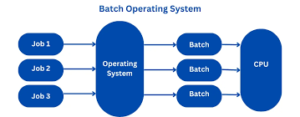Types of Operating Systems
An Operating System (OS) performs essential tasks such as managing files, processes, and memory, acting as a resource manager. It serves as an interface between the user and the machine, allowing seamless interaction between hardware and software. The OS is crucial for managing the overall functionality of any computing device.
Types of Operating Systems
- Batch Operating System: Jobs are grouped into batches and processed without user interaction.
- Multi-Programming System: Multiple programs reside in memory, with one executing at a time for better resource utilization.
- Multi-Processing System: Multiple CPUs are used for task execution, increasing system throughput.
- Multi-Tasking Operating System: Allows multiple tasks to run simultaneously, with each program receiving CPU time in a time-sharing manner.
- Time-Sharing Operating System: Multiple users share CPU time, with each task getting a specific time slot (quantum) for execution.
- Distributed Operating System: Autonomous computers are interconnected via a network, sharing resources and tasks.
- Network Operating System: Provides shared access to resources like files and printers over a network, running on servers.
- Real-Time Operating System: Designed for real-time applications requiring immediate response, like air traffic control or robotic systems.
1. Batch Operating System
In a Batch Operating System, the user does not interact directly with the computer. Instead, an operator collects jobs with similar requirements and groups them into batches. The system processes these batches
one after another, efficiently managing large volumes of tasks.

Advantages of Batch Operating System
- Multiple users can share batch systems simultaneously.
- Idle time for the system is minimal as jobs are processed in batches.
- It simplifies the management of repetitive tasks in large-scale systems.
Disadvantages of Batch Operating System
- Debugging batch systems can be challenging due to the lack of immediate interaction.
- The system can be costly to maintain and operate.
- If one job fails, subsequent jobs may be delayed indefinitely.
- It is often hard to predict job processing time as tasks remain in a queue.
Examples of Batch Operating Systems
- Payroll Systems
- Bank Statements
These systems are commonly used in environments that require repetitive task processing, such as financial or administrative systems.
